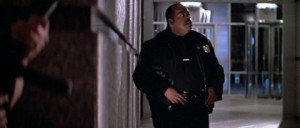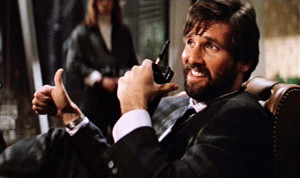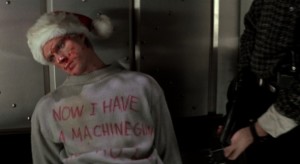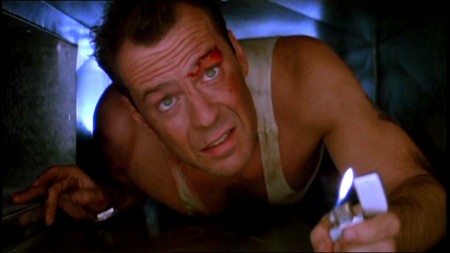The portrayal of the action hero is a lost art. The 80s and 90s accomplished the task so evenly, and with such zeal, that one has to wonder if all the Hollywood movie magic concerning muscle men, guns, explosions, and damsels in distress has been used up, leaving little over for our modern generation. Many movies try. Take, for instance, “Rambo,” the latest installment in the series, written and directed by Sylvester Stallone himself, or the “Expendables” series. But are these too little too late, helmed mostly by a legion of action icons past with no new talent brought to the table? Perhaps “Crank” and its sequel “Crank 2: High Voltage” starring Jason Statham can be seen to give the genre life support, but there is no denying that the actioners of today don’t measure up to the standards of old. And now, with the Christmas season approaching, there’s no better way to get into the spirit – both of the holidays and of C-4, machine guns, and one-liners – than to revisit John McTiernan’s 1988 icon “Die Hard.”
You need to look no further than the sheer number of “Die Hard” sequels to glimpse the impact of its original incarnation. Three sequels have proceeded Detective John McClane’s first high-octane terrorist romp, and it’s no surprise: with a budget of roughly $28M, “Die Hard” went on to bring in an astounding $128M worldwide, and cemented the catch phrase “Yippie Ki-Yay” in the minds of moviegoers everywhere. And, of course, the fact that it features such a widely varied and eclectic cast – helmed by McTiernan, known for such guy-fests as “Predator,” “Last Action Hero,” and “The Hunt for Red October” – certainly doesn’t hurt.

The movie stars Bruce Willis (“The Fifth Element,” “The Jackal”) as John McClane, a cop from New York City on his way to L.A. to visit his estranged wife for the holidays. Unlike many action films of today, “Die Hard” takes the time to build McClane’s character before clueing the audience in to his marital woes, however. We learn some things about him: he hates to fly. A fellow flight passenger attempts to assuage his fear of flying by telling him to curl his toes into little balls, which McClane simply scoffs at. We then see him getting along with ‘Argyle’ – a loquacious taxi-turned-limo driver who takes him to the illustrious Nakatomi Plaza where his wife Holly (Bonnie Bedelia, “Needful Things”) is a high profile exec for the Japanese firm.
Here we learn a little more: Holly moved out to L.A. for her career, leaving John behind in New York when he couldn’t just pack up and leave. However, they’re still married, and McClane is hoping to rekindle their marriage, attending the Nakatomi Corporation Christmas party and possibly staying with his wife for a much-needed vacation, allowing things haven’t changed too much. However, locating her office on the building’s 34th floor, her company listing placing her as “Holly Gennaro,” – her maiden name – shows him just how much things might have changed. However, “Die Hard” is poised as an action movie, and there’s not much action to be had in the marital strife of New York cop and his successful wife. Enter Hans Gruber (Alan Rickman, the “Harry Potter series”) a wildly enigmatic and sinister terrorist who infiltrates the Nakatomi Plaza with a group of men intent on holding the Corporation’s director, Joseph Takagi, hostage for the company’s multi-million dollar bearer bonds. Upon discovering their aim, Takagi is most perplexed. “You’re after money? What kind of terrorists are you?” Gruber’s response does little to answer his query: “Who said we were terrorists?” However, it isn’t long before a less than helpful Takagi, along with another would-be office do-gooder Harry Ellis (Hart Bochner) land the party in dire straights who find themselves hostages with no way out. However, before long we realize this not to be the case, as the cop from New York, John McClane, has eluded capture and attempts to foil the terrorists’ plot from within.
However, “Die Hard” is poised as an action movie, and there’s not much action to be had in the marital strife of New York cop and his successful wife. Enter Hans Gruber (Alan Rickman, the “Harry Potter series”) a wildly enigmatic and sinister terrorist who infiltrates the Nakatomi Plaza with a group of men intent on holding the Corporation’s director, Joseph Takagi, hostage for the company’s multi-million dollar bearer bonds. Upon discovering their aim, Takagi is most perplexed. “You’re after money? What kind of terrorists are you?” Gruber’s response does little to answer his query: “Who said we were terrorists?” However, it isn’t long before a less than helpful Takagi, along with another would-be office do-gooder Harry Ellis (Hart Bochner) land the party in dire straights who find themselves hostages with no way out. However, before long we realize this not to be the case, as the cop from New York, John McClane, has eluded capture and attempts to foil the terrorists’ plot from within.
What makes “Die Hard” work as a movie lies in its ability to deliver hard-punching scenes interwoven with humor and wit. There’s no shortage of scenes of terrorists falling prey to McClane as he wanders around the Plaza barefoot, making use of whatever weapons he comes across, ultimately killing one terrorist before shipping him back upstairs in an elevator, the words “Now I have a machine gun, ho ho ho” scrawled on his shirt. Other scenes only add to the tough-guy humor motif, featuring struggles between McClane and another terrorist who gives him advice on how to kill effectively, another who attempts to exact revenge for his fallen brother, and explosions, gun fights, and one-liners aplenty as McClane and Gruber get closer and closer to confrontation.

Bruce Willis does his part as an action hero with remarkable ease, which is even more impressive given his transition in and out of this role with movies such as “Unbreakable” and author Kurt Vonnegut’s “Breakfast of Champions.” He also seems to have the one-liner down to a science, getting under Gruber’s skin often without even being face to face with him. In one hilarious scene, McClane blows up an entire floor of the Plaza with plastic explosives he steals off of one of his men, in an attempt to alert authorities outside to the rising problem within. One of Gruber’s henchmen gasps, “They’re using artillery on us,” to which Gruber, who knows his quarry all too well simply remarks, “It’s him.”
However, all the credit shouldn’t go to Willis. As Gruber, Alan Rickman does a thoroughly engrossing job as the foe – part robber, part megalomaniac – who commands his ship with a steady arm. He’s leagues smarter than those in his employ, yet finds himself in McClane’s clutches more than a few times, until he discovers unlikely leverage – McClane’s wife – among his nameless hostages. What works most about Rickman’s performance is the cold, business-like tone he brings to Gruber, appearing at once comical yet a man who could kill you at the drop of a hat. And Rickman, who has had much success in films such as “Robin Hood,” playing the sinister ‘Sheriff of Nottingham,’ and “Love Actually,” playing a cheating husband, shows a great of amount of diversity in his roles which help to shape the evil Hans Gruber as a formidable villain to behold.
 Supporting characters, such as Reginald VelJohnson as Sgt. Al Powell, lend warmth and humor to the movie. Vel Johnson, a bit sarcastic and stalwart in his portrayal of Carl Winslow on “Family Matters,” here comes off solid and steady as a cop who becomes McClane’s only link to the outside. As McClane comes closer and closer to confronting Grueber, the movie unfortunately throws in a flimsy side-plot of two hard-assed and bureaucratic FBI agents who would rather kill everyone in the building than stage a rescue, but luckily, this somehow ads to the heroics of McClane rather than subtracting from the movie. Additionally, the inclusion of the wily limo driver Argyle (De’voreaux White) adds a welcome diversion from the action, and an unlikely hero when needed.
Supporting characters, such as Reginald VelJohnson as Sgt. Al Powell, lend warmth and humor to the movie. Vel Johnson, a bit sarcastic and stalwart in his portrayal of Carl Winslow on “Family Matters,” here comes off solid and steady as a cop who becomes McClane’s only link to the outside. As McClane comes closer and closer to confronting Grueber, the movie unfortunately throws in a flimsy side-plot of two hard-assed and bureaucratic FBI agents who would rather kill everyone in the building than stage a rescue, but luckily, this somehow ads to the heroics of McClane rather than subtracting from the movie. Additionally, the inclusion of the wily limo driver Argyle (De’voreaux White) adds a welcome diversion from the action, and an unlikely hero when needed.
All in all, “Die Hard” comes off as just what it is promoted to be – a high-energy action movie. There’s no philosophy, no filler, and no sublime moral waiting at the end to be unwrapped. It’s a good guy-vs.-bad guy epic, with plenty of guns, guts, and glory packed in between. Willis turns in a solid performance as its protagonist, and in doing so created an icon, and a legion of sequels not yet exhausted (“A Good Day to Die Hard” is slated for release sometime in 2013). The supporting cast is all top-notch, with special note to Rickman, who creates in Gruber an anti-hero you often want to see win just as much as McClane. The special effects are effective and laugh-inducing, and, underneath it all, the movie is just plain fun.
“Die Hard” is a nostalgic look back at an era of action sorely missing from the modern gambit of remakes and reboots – and if you like Christmas but action is more your thing, you’d be hard pressed to find a better holiday opener.
– by Mark Ziobro



1 Comment
Only an a greatest Christmas movie of all time needs a+ bitch